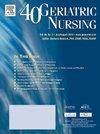Laughing in the face of death: The association among humor styles, religious fatalism, and thanatophobia in hospitalized geriatric patients
IF 2.5
3区 医学
Q3 GERIATRICS & GERONTOLOGY
引用次数: 0
Abstract
Background
Aging often accompanies various cognitive, physical, and psychological changes, including confronting mortality. As individuals approach the end of their lives, they may experience death anxiety or thanatophobia, an intense fear of dying. This fear of death can have a significant impact on the psychological well-being of older adults. This study investigated the relationship among humor styles, religious fatalism, and thanatophobia in hospitalized geriatric patients.
Methods
A cross-sectional survey was conducted on 270 older adults using non-probability convenience sampling. Four tools were employed to collect the data: the Sociodemographic and Clinical Data Sheet, the Arabic Scale of Death Anxiety, the Religious Health Fatalism Questionnaire, and the Humor Styles Questionnaire.
Results
The study found a relatively high level of death anxiety among hospitalized geriatric patients, with a mean death anxiety score of 75.23 (8.86). The participants’ dominant humor styles were self-enhancing (mean = 33.53, SD = 5.11) and affiliative (mean = 27.50, SD = 4.85). Correlation analysis showed significant negative relationships between sense of humor styles and death anxiety (r = -0.553, p < 0.001). This included self-enhancing humor, which helps cope with adversity; affiliative humor, which builds social bonds; aggressive humor, which belittles others; and self-defeating humor, which seeks approval at the cost of self-esteem. Conversely, religious health fatalism and its subscales positively correlated with death anxiety (r = 0.45, p < 0.01).
Conclusion
The findings showed that religious health fatalism—beliefs in divine providence, predetermined fate, and helplessness—predicts increased death anxiety. In contrast, self-enhancing, affiliative, aggressive, and self-defeating humor styles are negatively linked to thanatophobia, suggesting they may serve as psychological buffers. These humor styles could aid coping by reducing death anxiety. The study also found a negative correlation between religious health fatalism and humor, indicating that deeply held beliefs in divine control might limit humor's use as a coping mechanism. These results highlight the potential of humor-based interventions to alleviate death anxiety in geriatric patients while considering the complex role of religious fatalism in coping strategies.
面对死亡笑:幽默风格、宗教宿命论和住院老年病人死亡恐惧症之间的关系
衰老通常伴随着各种认知、身体和心理变化,包括面对死亡。当人们接近生命的尽头时,他们可能会经历死亡焦虑或死亡恐惧症,一种对死亡的强烈恐惧。这种对死亡的恐惧会对老年人的心理健康产生重大影响。本研究旨在探讨幽默风格、宗教宿命论与老年住院病人死亡恐惧症的关系。方法采用非概率方便抽样法对270名老年人进行横断面调查。采用四种工具收集数据:社会人口学和临床数据表、阿拉伯死亡焦虑量表、宗教健康宿命论问卷和幽默风格问卷。结果老年住院患者死亡焦虑水平较高,平均死亡焦虑评分为75.23分(8.86分)。参与者的主要幽默类型为自我增强型(平均为33.53,SD = 5.11)和亲和性(平均为27.50,SD = 4.85)。相关分析显示,幽默风格与死亡焦虑呈显著负相关(r = -0.553, p <;0.001)。这包括有助于应对逆境的自我提升的幽默;建立社会联系的附属幽默;咄咄逼人的幽默,贬低他人;还有自我挫败的幽默,以牺牲自尊为代价寻求认同。反之,宗教健康宿命论及其子量表与死亡焦虑呈正相关(r = 0.45, p <;0.01)。结论:研究结果表明,宗教健康宿命论——相信天意、宿命和无助——预示着死亡焦虑的增加。相比之下,自我提升、附属、攻击性和自我挫败的幽默风格与死亡恐惧症呈负相关,这表明它们可能起到心理缓冲的作用。这些幽默风格有助于减少死亡焦虑。研究还发现,宗教健康宿命论与幽默之间存在负相关,这表明对神的控制的根深蒂固的信仰可能会限制幽默作为一种应对机制的使用。这些结果强调了幽默干预在缓解老年患者死亡焦虑方面的潜力,同时考虑到宗教宿命论在应对策略中的复杂作用。
本文章由计算机程序翻译,如有差异,请以英文原文为准。
求助全文
约1分钟内获得全文
求助全文
来源期刊

Geriatric Nursing
医学-护理
CiteScore
3.80
自引率
7.40%
发文量
257
审稿时长
>12 weeks
期刊介绍:
Geriatric Nursing is a comprehensive source for clinical information and management advice relating to the care of older adults. The journal''s peer-reviewed articles report the latest developments in the management of acute and chronic disorders and provide practical advice on care of older adults across the long term continuum. Geriatric Nursing addresses current issues related to drugs, advance directives, staff development and management, legal issues, client and caregiver education, infection control, and other topics. The journal is written specifically for nurses and nurse practitioners who work with older adults in any care setting.
 求助内容:
求助内容: 应助结果提醒方式:
应助结果提醒方式:


